
 [rating=5]High-spirited and wildly entertaining, “The Gospel at Colonus” doesn’t just tell a story about the soul of the tragic figure of Oedipus, but it is also about the soul of the Black Pentecostal Church. This energetic production takes the form of an operetta/religious service with the foundation being in gospel music. Conceived and adapted by Lee Breuer with music by Bob Telson, this modern interpretation of Sophocles’ classic myth is told in rhythmic, uplifting, and expressive song, featuring great soloists and responsive spiritual music, which moves the audience not only emotionally but to a locus in the fantasy world. This humanizes the Ancient Greek tragedy that dates from the end of the fifth century B.C.E. and injects some levity into it.
[rating=5]High-spirited and wildly entertaining, “The Gospel at Colonus” doesn’t just tell a story about the soul of the tragic figure of Oedipus, but it is also about the soul of the Black Pentecostal Church. This energetic production takes the form of an operetta/religious service with the foundation being in gospel music. Conceived and adapted by Lee Breuer with music by Bob Telson, this modern interpretation of Sophocles’ classic myth is told in rhythmic, uplifting, and expressive song, featuring great soloists and responsive spiritual music, which moves the audience not only emotionally but to a locus in the fantasy world. This humanizes the Ancient Greek tragedy that dates from the end of the fifth century B.C.E. and injects some levity into it.
In stirring and fiery language, Mark Spates Smith in the role of Theseus pontificates as narrator, interpreter, and spiritual leader, who preaches the Gospel at his “loud” African American church. We, the audience, serve as his congregants and are all encouraged to join in and affirm his inspired message. Today’s sermon has to do with the parable of the life of Oedipus and the lessons that we can learn from it. We see Oedipus (Kevin Roston, Jr. and his resonant singing voice) in his waning years, arriving in the sacred city of Colonus. He wears dark glasses and stumbles about, having already blinded himself as expiation for the sin of having murdered his father, marrying his mother, and bearing children by her. Oedipus has put himself into his own version of hell so that he would suffer on earth through the end of his days, only to be reliant on his daughter Antigone (Aeriel Williams) to lead him everywhere. At Colonus, the two of them catch up with his missing daughter, Antigone’s sister Ismene (Ariana Burks) in a tearful reunion. But when the citizens there learn his name, they are immediately stunned and turn away from him.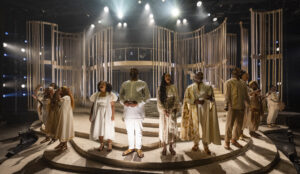
But Theseus, who is Oedipus’s defender, takes to heart what the Pentecostal Church teaches us: that while Oedipus was a flawed man, he is never beyond redemption. In fact, it is his flaws that add power to his story. The preacher thus makes the connection between his life and ours: Oedipus’s failure to live up to the highest moral standard is very much like our own failures to do so, for, as human beings, we always fall short of perfection. We are born into circumstances beyond our control and come into sin often not by intent but by happenstance. However, in keeping with the religious philosophy of Pentecostalism, we can be saved by grace and thus can be redeemed and wind up in heaven.
King Creon of Thebes (Timothy Edward Kane) makes an appearance and tells Oedipus and his followers that he is welcome to return home from exile. This offer is met by glares and stares by Oedipus’s adherents. It is after Creon leaves for good that Oedipus’s son Polyneices (Kai A. Ealy) comes on the scene and is cursed by his father for his disrespect, presumably because he wants to fight his brother Eteocles for the Theban throne.
The tale ends with the death of Oedipus. We witness how he and his soul are restored mystically by God. Now he can sing hallelujah with those both living and dead. With his soul is in heaven, there is no need for us on earth to mourn anymore.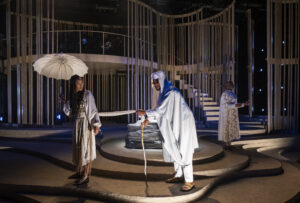
John Culbert’s scenic design is smashing in its beauty and its imagination! It is the first thing we see when we walk into the theatre. What an incredible spectacle! A large rock simultaneously serves as an altar and a touchstone and a rock of ages, and multilevel cascading waves make up the stage floor. We see a two-story stage, held up by parallel wooden boards and the inclusion of two wooden staircases. What a great backdrop for the superb directing by Mark J.P. Hood and Charles Newell with Taron Patton, plus movement design by Cristin Carole. Characters fill the stage and the audience; the actors in the aisles are seeded become fellow congregants. All aspects of the gorgeous stage and the aisles are in play. Lighting design by Keith Parham works very well in telling this story, and sound design by Sarah Ramos is nicely done.
But, of course, it is the singers, with their incredible vocal ranges, who make the show! In addition to the main characters (who double as outstanding singers), the rousing vocalists include: Shari Addison, Eric A. Lewis, Juwon Tyrel Perry, Jessica Brooke Seals, Jerica Exum, Shantina Lynet, Isaac Ray, Eva Ruwé, and Cherise Thomas. Music direction by Mark J.P. Hood is wonderful, and the musicians could not have performed any better. They consist of: Mahmoud Khan (associate music director, conductor, keyboard, organist), Joshua Griffin (bass guitar), Amr Fahmy (keyboard), Oscar Brown, Jr. (lead guitar), and Leonard Maddox, Jr. (drums), all of whom are seated at top level of the stage.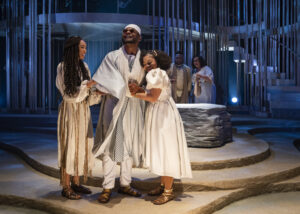
The clothing in this show is varied, often anachronistic and a blend of types, but perfect for this production, thanks to the incredibly fine work of costume designer Raquel Adorno. Tunics and modern dresses, caftans and robes, caps and hair ornaments all make their appearance, and everybody wears sandals. While all are dressed in shades of white, off-white, and gold, the exception is Ealy (as Polyneices), who is the only one whose garment is in black with an interesting gold and white symbol on its face. Most ideal is what Theseus and Oedipus wear: outfits representing a unique combination of Ancient Greek garb and what a man might wear at a Black Pentecostal Church!
The classics live on from ancient days, not because they tell the exact same story from one era to the next, but because they strike a universal chord that speaks to us at the present moment. That is why the specifics will always look different (and will be interpreted differently) through today’s eyes—and especially in a neatly crafted presentation such as this one. Production dramaturg Wenke (Coco) Huang) has done a marvelous job concisely summarizing the plotline in the playbill. Also included (as a separate article) is a much deeper dive into Sophocles’ original account, the history of the Lee Breuer production (including the importance of the large stone as the archaeological site of a Greek theatre), and making linkages between these various elements and an authentically black spiritual expression.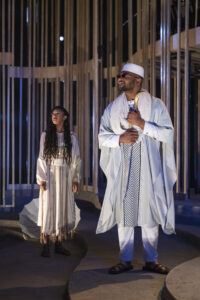
In all, “The Gospel at Colonus” a performance to remember! When the ancient myth is projected into the present-day, it makes perfect sense to use the tragic Greek figure of Oedipus as the basis for a sermon about God’s grace and His gifts to humanity. The vigor with which Theseus defends Oedipus teaches us that, although we are all flawed creatures, we are beautiful beings, each worthy of redemption. However, it is the exemplary solo and response gospel singing with wonderful lyrics by Breuer and Telson that make this production one-of-a-kind. In keeping with God’s plan, this show is pure magic!
“The Gospel at Colonus” is playing through June 11, 2023, at Court Theatre, 5535 S. Ellis Avenue, in Chicago, on the University of Chicago campus.
Tickets are $40.50 – $82.00.
Student, group, and military discounts are available.
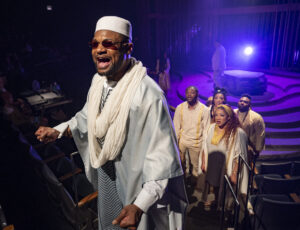 Performance schedule:
Performance schedule:
Wednesdays, Thursdays, and Fridays – 7:30 p.m.
Saturdays and Sundays – 2:00 p.m. and 7:30 p.m.
Accessible Performances:
Audio description on June 10, at 2:00 p.m./Touch Tour at 12:30 p.m.
Open captioning on June 11, at 2:00 p.m.
ASL interpretation On June 11, at 7:30 p.m.
For more information and to purchase tickets, go to: https://www.courttheatre.org/season-tickets/2022-2023-season/the-gospel-at-colonus-2023/ or call 773-753-4472 or visit the box office, located at 5535 S. Ellis Avenue.
For general information about Court Theatre and to learn about its other offerings, see: https://www.courttheatre.org/.
COVID requirements: None currently in effect.
To see what others are saying, visit www.theatreinchicago.com, go to Review Round-Up and click at “The Gospel at Colonus”.






More Stories
“Joe Turner’s Come and Gone”
“How I Learned What I Learned” reviewed by Julia W. Rath
“How to Know the Wild Flowers: A Map” reviewed by Julia W. Rath